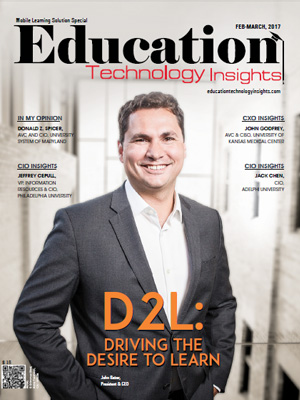THANK YOU FOR SUBSCRIBING
Be first to read the latest tech news, Industry Leader's Insights, and CIO interviews of medium and large enterprises exclusively from Education Technology Insights
Experiential Learning Opportunities Keep Students Engaged
Dr. Michael Mills, Vice President of E-Learning, Innovation and Teaching Excellence, Montgomery College
 Dr. Michael Mills, Vice President of E-Learning, Innovation and Teaching Excellence, Montgomery College
Dr. Michael Mills, Vice President of E-Learning, Innovation and Teaching Excellence, Montgomery CollegeImagine you’ve always been interested in learning how to juggle. You’ve watched people do it at shows and on television for years, and you’ve decided that you want to take up the activity.
You look into the offerings at your local community center, and someone there is offering a one-hour course. After registering, the big day has arrived. You head to the session thinking you are going to take three tennis balls and in no time learn how to juggle.
Instead, you are given a packet of instructions and told to read them. Once you finish reading, you are told to juggle. No tennis balls needed. No active learning necessary.
Of course, very few of us will ever learn how to juggle that way. It took me months of running up and down my back alley as a teenager learning. It was the experience of juggling that improved my skills.
Working with our students in higher education classrooms is similar. If we want them to learn, we have to provide experiences that will help create context for this learning. We also have to afford students the time to reflect on that experience. As a result of doing and reflecting, student engagement will remain high.
Kolb (1984) looked at learning as part of a four-stage cycle, with each stage enhancing the experiential opportunity for students:
 • Concrete Experience Stage – during this stage of the cycle, the learner is engaged in an authentic situation or hands-on activity. The focus here is on direct involvement.
• Concrete Experience Stage – during this stage of the cycle, the learner is engaged in an authentic situation or hands-on activity. The focus here is on direct involvement.
• Reflective Observation – during this stage, the learner notices what happened during the experience stage and relates that to past experiences or understandings. Introspection is a focus.
• Abstract conceptualization – during this stage, the learner uses the reflective observation to draw conclusions and make generalizations. Connections are made between the experience and existing knowledge and theories.
• Active experimentation – during this stage, the learner uses what was learned in abstract conceptualization, and experiments with new ideas or approaches. The learner again uses hands-on activities to learn by doing.
“Using experiential learning in the classroom setting keeps students engaged by providing them with relevant learning opportunities.”
Using experiential learning in the classroom setting keeps students engaged by providing them with relevant learning opportunities. Below are just a few examples:
1. Internships – students use hands-on opportunities to help solve real-world situations.
2. Community-based projects – students apply what they learned in the classroom to their own communities to make a positive impact.
3. Simulations – students assume specific roles in real-life situations to help them with solving problems and making decisions.
4. Experiments – students apply theoretical concepts to find practical solutions.
5. Undergraduate research – students work in teams to investigate problems, share ideas and develop solutions.
Providing students with experiences outside the classroom enhances what they learn in a traditional classroom environment.
Read Also
Goldilocks Regulation
Beyond the Quiz: Redefining Competence in eLearning
Beyond Theory and Into Monday Morning: Enhancing Graduate Programs for Teachers
Safeguarding Students in the Age of Deepfakes: An Educational Imperative
Delivering Excellence in Education through Transformative School Leadership
Curriculum Innovation for Student Success and Institutional Growth

I agree We use cookies on this website to enhance your user experience. By clicking any link on this page you are giving your consent for us to set cookies. More info
















.png)







